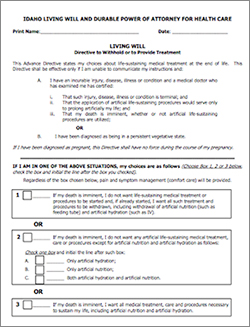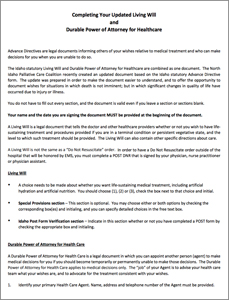One of the best ways to ensure your end-of-life wishes are honored is to have complete and up to date advance directives.
Advance directives are recommended for anyone over the age of 18, not just for those nearing the end of their life. Advance directives provide answers to questions your medical providers and loved ones may have such as:
- Who do you want to make your medical decisions (even temporarily) if you are unable?
- Do you want resuscitation to be attempted if you die?
- Under what circumstances do you want life support?

Download Advance Directive Form
(Download, Print and Complete Form)

Advance Directive Fillable
(Complete Online and Print)
When you have completed your advance directives remember to give a copy to your doctor’s office and to your power of attorney for healthcare, as well as other family members.
Frequently Asked Questions
What are advance directives?
Advance directives are legal documents informing others of the patient’s wishes relative to medical treatment and advising who can make medical decisions when the patient is unable.
What is a living will?
A living will is a legal document that tells the providers whether or not the patient wishes to have life-sustaining treatment and procedures provided if the patient is in terminal condition or persistent vegetative state, and the level to which such treatment should be provided. It can also contain other specific directions about the patient’s wishes and goals of care.
A living will is not the same as a “Do Not Resuscitate” order.
What is a durable power of attorney for healthcare?
A durable power of attorney for healthcare is a legal document where an “agent” is appointed to make medical decisions for the patient if the patient should become temporarily or permanently unable to make those decisions.
Applies to healthcare decisions only.
The healthcare POA’s job is to tell the patient’s healthcare team what the patient’s wishes are and to advocate for treatment consistent with the patient’s wishes.
What is the POST (Physician Orders for Scope of Treatment)?
The POST is a document which must be signed by your physician that tells doctors, EMS and other health care providers whether or not you wish to be resuscitated in the event that your heart stops or you stop breathing. You may also choose to indicate on the POST specific medical interventions and level of care you prefer. The POST is a permanent statement of your wishes relative to resuscitation and remains in effect both in and out of healthcare facilities until you or your physician revoke it.
When does my Durable Power of Attorney for Health Care take effect?
When you are unable to communicate and/or to express your wishes.
When does my Living Will take effect?
When the criteria stated in the Living Will are met (i.e., when a doctor certifies that you have a terminal, incurable illness or injury; or when you are permanently unconscious or in a persistent vegetative state. OR if the criteria set forth in the “Special Provisions” section have been met and you have chosen any of the provisions in that section.
If my Living Will says to withhold medical treatment, will medical personnel outside a hospital, such as paramedics, withhold treatment based on the Living Will alone?
No. In order to be “Do Not Resuscitate” (DNR) outside of a hospital, you must have a POST (Physician Orders for Scope of Treatment) that designates your choice of DNR. The POST form must be obtained through your physician, nurse practitioner or physician assistant, and must be signed by your provider in order to be valid.
What if I change my mind about the options in my Living Will or my choice of Health Care Agent(s)?
You may revoke your Advance Directives at any time and create new Advance Directives. AND you are the only person who can change or revoke your Advance Directives.
Can my Health Care Agent override the choices I have made in my Advance Directives?
No. Your Health Care Agent’s “job” is to make your wishes known and to advocate with the health care team to ensure your wishes are followed. You should make sure that the Health Care Agent and any alternate(s) you have chosen are willing and able to follow your wishes.
Who should have copies of my Advance Directives?
You should keep the original document in a safe place, but one that is accessible to your family in case it becomes necessary to utilize the documents (i.e., not in a safe or safe deposit box). You should provide copies of the documents to your Health Care Agent, your primary care physician, and your local hospital. You should also talk with your family, your Health Care Agent and your primary care physician about your wishes.
Does my Living Will/Durable Power of Attorney for Health Care document require witnesses or notarization?
Per Idaho Statute, no witnesses or notarization are required for the Living Will or Durable Power of Attorney for Health Care.


